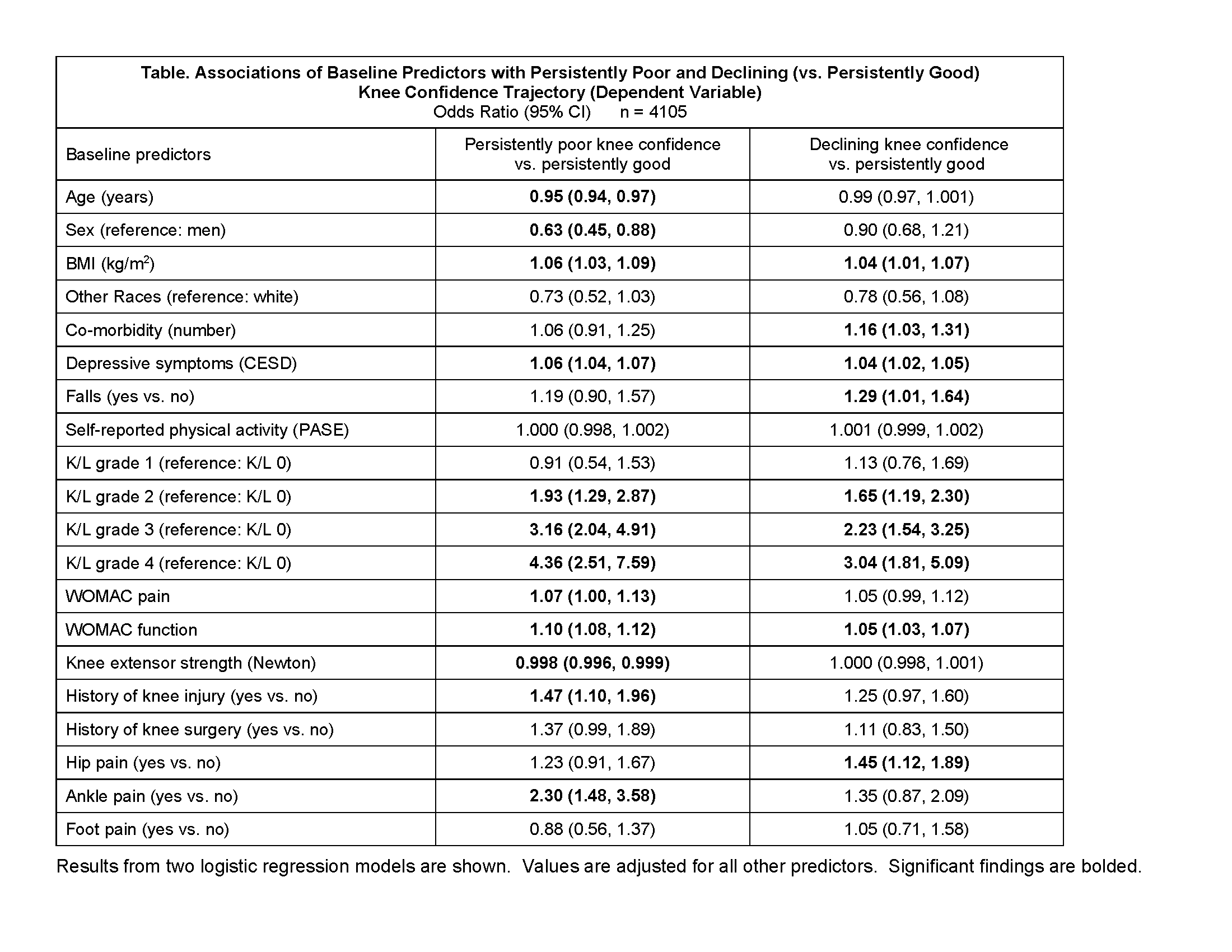Session Information
Date: Sunday, November 5, 2017
Title: Osteoarthritis – Clinical Aspects I: Pain and Functional Outcomes
Session Type: ACR Concurrent Abstract Session
Session Time: 4:30PM-6:00PM
Background/Purpose: Lack of knee confidence, a frequent complaint, has been associated with function decline in knee OA. Given its key role in weight-bearing activities, a better understanding of how confidence changes over time and modifiable factors associated with poor trajectories will inform strategies to help to prevent function decline. Our objectives were to identify, in persons with or at higher risk for knee OA, distinct trajectories of knee confidence over 8 years and baseline factors associated with poor trajectories.
Methods: The OAI is a prospective longitudinal cohort study of persons with or at higher risk for knee OA aged 45-79 yrs. Knee confidence was self-reported annually from baseline to 96m in the KOOS (Knee Injury and Osteoarthritis Score), as how much an individual is troubled by lack of confidence in their knees: 0, not at all; 1, mildly, 2, moderately, 3, severely, and 4, extremely. Confidence trajectories for % with score 2-4 were modeled using 4515 OAI participants who had ≥3 time points for confidence. Latent class models identified groups with a similar underlying trajectory, and, in 4105 persons with complete baseline data, logistic regression was used to model associations of baseline predictors with poor (vs. good) trajectories.
Results: We identified 4 distinct knee confidence trajectories (Figure), persistently good, declining, improving, and persistently poor, with estimated probabilities to each trajectory of 62.9%, 11.0%, 14.7%, and 11.3%, respectively. The 4105 persons had a mean age 61.4 years (SD 9.2), BMI 28.6 kg/m2 (4.8), and 2381 (58.0%) were women. As shown in the Table, baseline factors associated with both persistently poor and declining confidence were BMI, depressive symptoms, disease severity, and worse function; with persistently poor only were younger age, male sex, extensor weakness, injury, and knee and ankle pain; with declining only were comorbidity, falls, and hip pain.
Conclusion: Four distinct 8-year knee confidence trajectories were identified in persons with or at higher risk for knee OA. Targeting BMI, depressive symptoms, function, extensor weakness, and knee, ankle, and hip pain may help to prevent poor or declining confidence trajectories.
To cite this abstract in AMA style:
Chang AH, Lee J, Almagor O, Chmiel JS, Moisio KC, Hayes KW, Szymaszek J, Sharma L. Knee Confidence Trajectories over 8 Years and Factors Associated with Poor Trajectories: Data from the Osteoarthritis Initiative [abstract]. Arthritis Rheumatol. 2017; 69 (suppl 10). https://acrabstracts.org/abstract/knee-confidence-trajectories-over-8-years-and-factors-associated-with-poor-trajectories-data-from-the-osteoarthritis-initiative/. Accessed .« Back to 2017 ACR/ARHP Annual Meeting
ACR Meeting Abstracts - https://acrabstracts.org/abstract/knee-confidence-trajectories-over-8-years-and-factors-associated-with-poor-trajectories-data-from-the-osteoarthritis-initiative/


